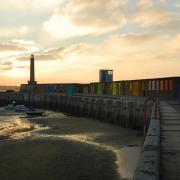With the world demand for food increasing, producing enough to feed our growing population is a big challenge. Here’s how we can all help to do our bit in Kent
With the General Election on everyone’s minds this month, I am reminded of this quote or more likely mis-quote from Pliny: “Every politician should be aware of the problem of wheat.”
The Kent candidates’ campaigns have been focusing on how their party would govern the nation over the next five years.
But no one is talking about ‘wheat’ and in the world of Pliny, food for the people was a key election winner. Today we hardly give a thought to where or how cheap, wholesome food arrives on our plates, but it would be a foolish to take lightly our food security. The bulk of the Godinton House estate is farmed, as is most of Kent, so the future of agriculture is critical. Kent leads in fruit production but if we see dramatic changes, the impacts will be felt by all.
Buying food from the local convenience store, supermarket or farm shop is taken for granted by most of us, yet producing enough food to feed a growing population is a huge challenge; demand for food is growing and other nations have wealth and power to compete for scarce resources
The UK imports around 40 per cent of the total food consumed and we rely on imports and export markets to feed us and drive economic growth. Shifting the balance further away from self sufficiency could put us in a position of dependence.
Food security does not mean 100 per cent domestic production, but rather a diversified supply from a number of sources. So by spreading the risk, it should help smooth out any significant falls in production from a single source or country.
As a nation we should certainly reduce the volume of food we waste and every hectare of agricultural land will need to produce more. Yet this requirement sits alongside the work of farmers and landowners to protect and support the natural environment and reduce the use of natural and chemical resources.
Climate change is also expected to impose greater limitations on food production, for example as incidences of Kent farmers’ crops being ruined by severe flooding or drought become more frequent.
The challenge is not insurmountable if the right policy decisions are taken now. Firstly, to produce food sustainably we must remain open as a nation to the use of new technologies. Kent is home to the world-class agricultural biotechnology centre East Malling Research leading the field; we should make the most of this asset.
The Government must continue to invest in specialist research and farmers and landowners must continue to work efficiently and take advantage of these new technologies. Early commercialisation of this excellent research is the key.
Secondly, we also need to see greater recognition that food production is dependent on farmland. Policy to manage flooding, for example, should not treat farmland as easily dispensable.
Farms must be commercially viable to carry on producing food. More sustainable farming will only be possible through a more equitable share of risk and profit along the food supply chain, rather than farmers being continually squeezed like we have seen in the dairy industry.
Food production must remain financially workable for farmers so that agriculture continues to make up a significant element of a modern diversified farm. Payments through the EU’s Common Agricultural Policy are a key part of this commercial mix, and critical to enable agriculture to go hand in hand with conservation.
Farmers can use the advice and support available through the CLA to run their farm businesses efficiently and successfully, but the next Government must have a robust understanding of all of these factors when making policy decisions.
n



























